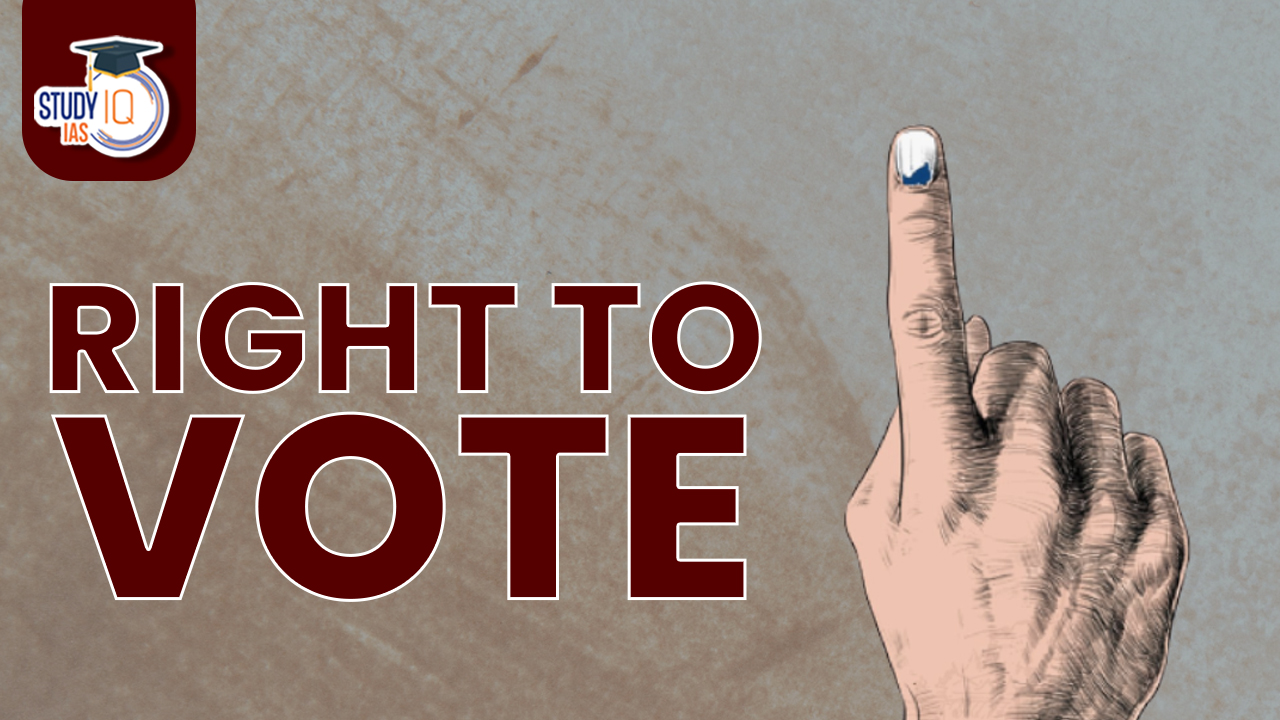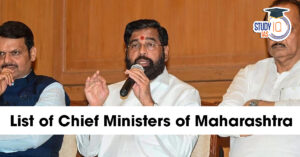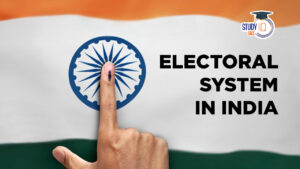Table of Contents
Context: The Supreme Court is currently hearing petitions challenging the Special Intensive Revision (SIR) of electoral rolls in Bihar. A key issue in the debate is the legal status of the ‘right to vote.’
Right to Vote
- The right to vote is not a Fundamental Right but is a statutory right (Anoop Baranwal v. Union of India, 2023 case)
- It is mentioned under Article 326 in the Constitution of India.
- The 61st Constitutional Amendment Act, 1988 reduced the voting age (21 to 18 years) in India.
- The right to vote is not absolute—subject to citizenship, age, residence, & legal disqualifications.
- Representation of the People Act, 1950:
- Section 62: Only those listed in the electoral roll can vote.
- Disqualifies those in prison or disqualified by law
- Section 16: Non-citizens cannot vote.
- Section 19: Must be 18+ and ordinarily resident in the constituency.
- Representation of the People Act, 1950:
Different Types Right in India
|
Different Types Right in India |
||
| Type of Right | Definition | Examples |
| Natural Rights | Inherent and inalienable rights, derived from human nature and reason. | Right to life, liberty, and privacy. Not directly enforceable in courts unless codified. |
| Fundamental Rights | Guaranteed under Part III of the Constitution and enforceable by the Supreme Court under Article 32. | Right to equality (Art. 14), freedom of speech (Art. 19), right to life (Art. 21), etc. |
| Constitutional Rights | Rights provided elsewhere in the Constitution (outside Part III). | Right to vote (Art. 326), Right to property (Art. 300A), freedom of trade (Art. 301) |
| Statutory (Legal) Rights | Rights granted by ordinary laws passed by Parliament or State legislatures. | Right to education under RTE Act, right to food under NFSA, MGNREGA employment rights |
Voting Rights for Women in India
Voting rights for women in India have evolved, and today, women enjoy equal voting rights on par with men. Here is a brief history of women’s voting rights in India:
- Pre-Independence Period: During British colonial rule in India, women did not have the right to vote. The Indian National Congress and other political movements advocated for greater political rights for all citizens, including women.
- Post-Independence: After India gained independence in 1947, the Indian Constitution was adopted in 1950. The Constitution of India granted universal adult suffrage, which means that all Indian citizens, regardless of gender, were granted the right to vote. This was a significant step forward in ensuring equal voting rights for women.
- First General Elections (1952): The first general elections held in 1952 allowed women to participate as voters on an equal footing with men. Many women participated in this historic election, both as voters and as candidates.
- Promotion of Women’s Participation: Over the years, various government and non-governmental organisations have worked to promote women’s participation in the electoral process. This includes initiatives to increase voter registration among women and promote their representation in elected offices.
- Reservation of Seats: To address gender disparities in political representation, India has implemented a reservation system for women in local government bodies, known as Panchayats and Municipalities. A certain percentage of seats are reserved for women in these bodies to ensure their active participation.
- Increasing Participation: Despite challenges and cultural barriers, the participation of women in the Indian electoral process has been steadily increasing. Women have been elected to various political offices, including the position of President and the Prime Minister.
Today, women in India have the same voting rights as men, and they play a vital role in shaping the country’s democratic processes through their participation in elections. While progress has been made, efforts continue to further empower women in politics and increase their representation in all levels of government.
Constitutional Provisions for Right to Vote in India
The right to vote in the Indian Constitution is primarily guaranteed by Article 326. Here’s what Article 326 of the Indian Constitution states:
Article 326: “Elections to the House of the People and to the Legislative Assemblies of States to be based on adult suffrage.—
(1) The elections to the House of the People and to the Legislative Assembly of every State shall be based on adult suffrage; that is to say, every person who is a citizen of India and who is not less than eighteen years of age on such date as may be fixed in that behalf by or under any law made by the appropriate Legislature and is not otherwise disqualified under this Constitution or any law made by the appropriate Legislature on the ground of non-residence, unsoundness of mind, crime or corrupt or illegal practice, shall be entitled to be registered as a voter at any such election.
(2) No person shall be ineligible for inclusion in any such roll or claim to be included in any special electoral roll for any such constituency or be entitled to vote at any such election if he is not disqualified under any law made by the appropriate Legislature on the ground of non-residence, unsoundness of mind, crime or corrupt or illegal practice.”
This article establishes the principle of universal adult suffrage, which means that every citizen of India who is 18 years of age or older has the right to vote in elections to the House of the People (Lok Sabha) and the Legislative Assemblies of States (Vidhan Sabha) subject to certain disqualifications as specified by the Constitution or laws passed by the legislature.
The right to vote is one of the fundamental rights of Indian citizens and is a key element of India’s democratic system, ensuring that eligible citizens have the opportunity to participate in the electoral process and choose their representatives in government.
Is the Right to Vote a Fundamental, Constitutional, or Statutory Right?
| Judicial Interpretation: Is the Right to Vote a Fundamental, Constitutional, or Statutory Right? | ||
| Case Name | Year | Court’s Ruling |
| N.P. Ponnuswami v. Returning Officer | 1952 | Statutory right – Voting is created and regulated by statute (RP Acts). |
| Jyoti Basu v. Debi Ghosal | 1982 | Reaffirmed voting is neither a fundamental right nor a common law right, only statutory. |
| PUCL v. Union of India | 2003 | Justice P.V. Reddy observed voting may be a constitutional right, though not fundamental. |
| Kuldip Nayar v. Union of India | 2006 | Constitution Bench reaffirmed that the right to vote is a statutory right. |
| Rajbala v. State of Haryana | 2015 | Division Bench held voting is a constitutional right, based on PUCL judgment. |
| Anoop Baranwal v. Union of India | 2023 | Majority opinion reaffirmed Kuldip Nayar: Right to vote is only a statutory right. |
| Justice Ajay Rastogi (Dissent in Anoop Baranwal) | 2023 | Argued that right to vote expresses freedom of choice (Art. 19(1)(a)), integral to democracy. |


 List of Chief Ministers of Maharashtra F...
List of Chief Ministers of Maharashtra F...
 Electoral System in India 2026: SIR Upda...
Electoral System in India 2026: SIR Upda...
 SLAPP Suits: Meaning, Examples, Impact o...
SLAPP Suits: Meaning, Examples, Impact o...

























